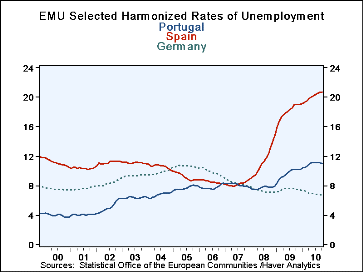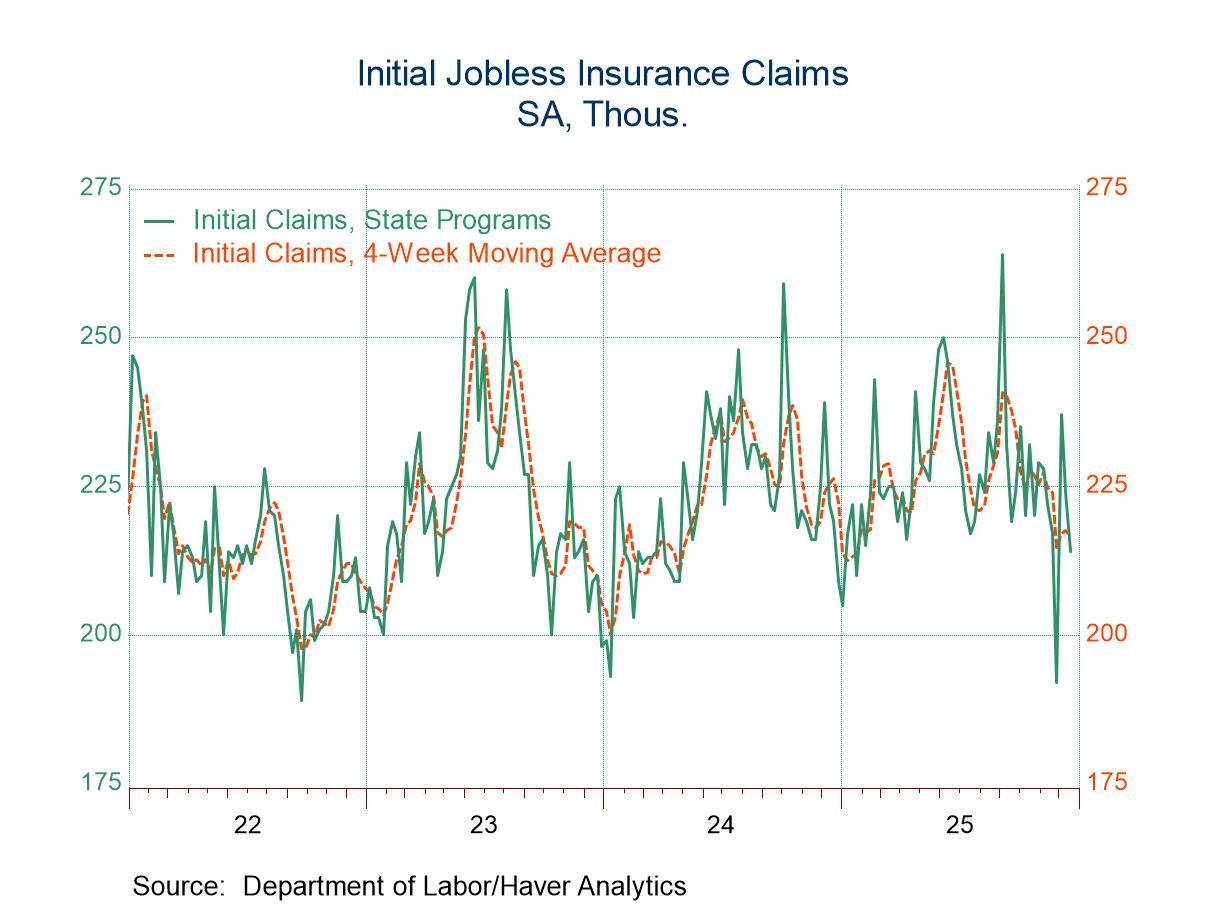 Global| Dec 02 2010
Global| Dec 02 2010Internal Divergence Accentuates European Financial Crisis Or…Hitting a Bull’s Eye in the Wrong Target
Summary
Symptoms Vs disease - When talking about the EMU and its financial troubles we speak of its banks and the interest differentials paid on government debt and a host of financial data. These financial indicators are the manifestations [...]
 Symptoms Vs disease - When talking about the EMU and its financial troubles we speak of its banks and the interest differentials paid on government debt and a host of financial data. These financial indicators are the manifestations of policies allowed to go awry for too long. It is the real sector problems that ran amok. If we look at the divergence of the unemployment rates from the areas average mark for a group of six EMU nations (Germany, France, Italy Spain Ireland and Greece) we find some extraordinary trends. EMU had been fooling itself for some time.
Symptoms Vs disease - When talking about the EMU and its financial troubles we speak of its banks and the interest differentials paid on government debt and a host of financial data. These financial indicators are the manifestations of policies allowed to go awry for too long. It is the real sector problems that ran amok. If we look at the divergence of the unemployment rates from the areas average mark for a group of six EMU nations (Germany, France, Italy Spain Ireland and Greece) we find some extraordinary trends. EMU had been fooling itself for some time.
EMU strikes gold, fools gold - From 1990 the sum of the divergence of the unemployment rates of this group from the overall EMU rate of unemployment was 13.3 percentage points (sum of the absolute value of the divergence). That divergence immediately began to fall, a great success story of the Zone -or so it seemed. The EMU rate itself was stable at first then moved lower as unemployment around the zone became more evenly distributed. Divergence moved to a range that fluctuated at around ten percentage points by late 2001 and by early 2005 it began to reduce further as the overall rate of unemployment fell. Growth was improving reducing unemployment and creating more unemployment equality.
False idols- By August 2008 the sum of the divergence of theses countries rates of unemployment from the EMU average was down to 6.2 percentage points. The Zone had reduced greatly the divergence in unemployment. Spain was the lone country from this group with a divergence from the EMU rate of more than one percentage point. Spains divergence was a wide 4.7 percentage points; its own unemployment rate was 11.8%.
The red herring - However, the convergence of this key piece of macro data belied the way that the various countries ‘got there. Greece had misrepresented is fiscal deficits which were huge. Spain had a huge building boom about to take place. National deficits were not minded very closely. Even France and Germany ran afoul of the Maastricht rules for a time.
Wrong goals- The smaller EMU nations concentrated on reducing unemployment and as we have seen in other presentations they did so at a cost see Italys Orders begin to outdistance France's at the following address:
The real signal everyone missed - Inflation differentials became magnified in the Zone but they were of ‘no consequence' since there were no restrictions on local fiscal policies that were binding (although the general Maastricht rules were in place, subject to ‘gaming') and there was no foreign exchange market to discipline the Zone's members. The single currency area shielded governments from the ill effects of their actions and allowed them to pursue other objectives. As a result inflation gaps in the zone persisted, price levels diverged and unemployment rates were enabled to converge – at least for a while.
Divergence re-emerges - After August of 2008 the divergence in rates of unemployment exploded to life out of nowhere. The financial crisis tore huge gaps in the fabric of a low common rate of unemployment. As the chart above shows, German unemployment was hardly affected and eventually fell while in Portugal unemployment rose and in Spain it surged as the property market collapsed.
Worse off than at the start - In trying to put Humpty Dumpty back together again, the sum of the divergence in unemployment rates is at a record high of 21.5 percentage points. This is 60 percent more divergence than in 1990.
Penalties are not the answer - Obviously the Zone needs to police itself better. It is not clear if better financial rules for dealing with distressed nations will do the trick since as we have seen once a crisis hits it's too late to pick and choose. If penalties that were concocted ‘in better times' are too draconian, they probably will not be imposed during a crisis. As we see Germany scramble to assist countries that have been ‘less prudent' we are reminded that Germany has its own stake in the euro and it has enlightened self-interest at work as German banks are greatly exposed to the troubled euro national borrowers. The German electorate may be angry at EU-wide bailouts but it doesn't seem to appreciate how much they themselves are at risk because of their own bank exposure. Crises tend to ensnare many and keep you from telling the sheep from the wolves. Still, the wolves escape. The sheep wind up with plenty of mutton.
Euro Fish or fowl? Obviously the best situation is to prevent these crises from developing. Europe probably needs to decide whether it is a collection of nationalities or whether it wishes to be truly European. Being European for some things and Italian or German for others is just not going to work. That much seems clear.
Divergence as a measure of time - The divergence in the rates of unemployment tells a tale of how long it will take for this current cycle's problems to be fixed. Unemployment is notoriously difficult to bring down largely because it is a moving target. You must create jobs enough to absorb new labor market entrants created by ordinary population growth and make progress on reducing the stock of unemployed at the same time. That number is so huge in Spain that many people probably will never work again.
The official bird is the dodo the official medicine is snake oil? Spain's unemployment rate which was just refreshed in a data report today shows its rate stayed at 20.7% in October, a level to which it rose just last month. Obviously it's too soon to say that Spain has stabilized. This is country under financial pressure to reduce its fiscal gap. With unemployment over 20% how does it do that? Spain's rate was below 10% last in April of 2008. The erosion and dislocation has been horrific. The impact of long terms unemployment is haunting. The solution for Spain should not be to depress its fiscal activities and further slow the economy and dislocate workers. Spain needs to reorganize and to redeploy its dislocated resources. But the crisis and the German solution of austerity for all is just about the official medicine of the zone.
Fairy tale gone wrong - Once upon a time the Zone was an idea. It became a policy called the snake in the tunnel which was a bounded system of exchange rate variation which was employed to try and harmonize macroeconomic cycles and structural elements ahead of the formation of the actual Zone. Now all that's left of this is in the snake oil that is the solution for all that ails it: Das austerity.
| Unemployment rate and changes | ||||||
|---|---|---|---|---|---|---|
| Rate | Level | Simple Changes | ||||
| Oct-10 | Sep-10 | Aug-10 | 3-Mo | 6-Mo | 12-Mo | |
| EU-Urate | 9.6 | 9.6 | 9.5 | 0 | 0 | 0.2 |
| EMU-Urate | 10.1 | 10.0 | 10.0 | 0.1 | 0.1 | 0.2 |
| Unempl Rate and Changes | m/m% | % changes (ar) | ||||
| EU-U 000s | 0.4% | 0.2% | -0.2% | 0.4% | 0.0% | 2.6% |
| EMU-U 000s | 0.5% | 0.3% | 0.0% | 0.8% | 1.1% | 2.6% |
| Unemployment Rates | Level | Simple Changes | ||||
| Germany | 6.7 | 6.7 | 6.8 | -0.1 | -0.3 | -0.8 |
| France | 9.8 | 9.9 | 9.9 | 0 | 0 | -0.1 |
| Spain | 20.7 | 20.7 | 20.5 | 0.3 | 0.9 | 1.7 |
| Ireland | 14.1 | 14.1 | 13.9 | 0.3 | 0.9 | 1.1 |
| USA | 9.6 | 9.6 | 9.6 | 0.1 | -0.3 | -0.5 |
| Japan | 5.1 | 5 | 5.1 | -0.1 | 0 | -0.1 |
Robert Brusca
AuthorMore in Author Profile »Robert A. Brusca is Chief Economist of Fact and Opinion Economics, a consulting firm he founded in Manhattan. He has been an economist on Wall Street for over 25 years. He has visited central banking and large institutional clients in over 30 countries in his career as an economist. Mr. Brusca was a Divisional Research Chief at the Federal Reserve Bank of NY (Chief of the International Financial markets Division), a Fed Watcher at Irving Trust and Chief Economist at Nikko Securities International. He is widely quoted and appears in various media. Mr. Brusca holds an MA and Ph.D. in economics from Michigan State University and a BA in Economics from the University of Michigan. His research pursues his strong interests in non aligned policy economics as well as international economics. FAO Economics’ research targets investors to assist them in making better investment decisions in stocks, bonds and in a variety of international assets. The company does not manage money and has no conflicts in giving economic advice.






